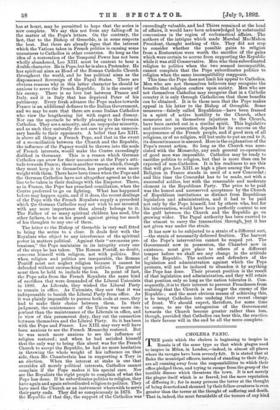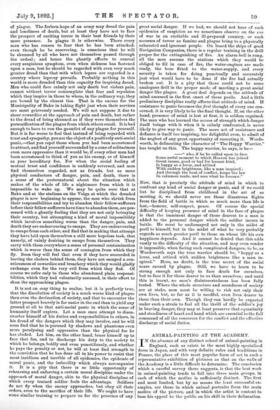CHOLERA PANIC. T HE panic which the cholera is beginning to
inspire in Russia is of the same type as that which plague used to inspire in Milan, in London,—indeed, in almost all places where its ravages have been severely felt. It is stated that at Bakn the municipal officers, instead of standing to their duty, are all running away from the responsibilities to which their office pledged them, and trying to escape from the grasp of the terrible disease which threatens the town. It is not merely the plague itself which is so feared, but the mere reputation of diffusing it; for in many persons the terror at the thought of being deserted and shunned by their fellow-creatures is even greater than the terror at the thought of suffering and death. That is, indeed, the most formidable of the terrors of any kind.
of plague. The forlorn-hope of an army may dread the pain and loneliness of death, but at least they have not to face the prospect of exciting terror in their best friends by their mere presence. In plague it is otherwise. There every man who has reason to fear that he has been attacked. even though he be recovering, is conscious that he will be shunned by all who have not themselves passed through the ordeal; and hence the ghastly efforts to conceal every suspicious symptom, even when sickness has fastened upon a man, lest he should be regarded with even very much greater dread than that with which lepers are regarded in a country where leprosy prevails. Probably ncthing in this world is more dreaded than this capacity for inspiring dread. Men who could face calmly not only death but violent pain, cannot without terror contemplate that fear and repulsion which they inspire in those to whom, in the ordinary way, they are bound by the closest ties. That is the excuse for the Municipality of Baku in taking flight just when their services are most grievously needed. We will not suppose it due to sheer cowardice at the approach of pain and death, but rather to the dread of being shunned as if they were themselves the personification of the plague from which others recoil. It is bad enough to have to run the gauntlet of any plague for yourself. But it is far worse to feel that instead of being regarded with trust and sympathy, you are the object of a positively anti-social panic,—that you repel those whom you had been accustomed to attract, and find yourself surrounded by a zone of solitariness even more oppressive than it would be, if every other man had been accustomed to think of you as his enemy, or of himself as your hereditary foe. For when the social feeling of mutual trust and confidence is suddenly reversed, and men find themselves regarded, not as friends, but as mere physical conductors of danger, pain, and death, there is a sense of the preternatural about the situation which makes of the whole of life a nightmare from which it is impossible to wake up. We may be quite sure that at Baku and at the stations on the Volga at which the dreaded plague is now beginning to appear, the men who shrink from their responsibilities and try to abandon their fellow-sufferers before their fellow-sufferers have time to abandon them, are pos- sessed with a ghastly feeling that they are not only betraying their country, but attempting a kind of moral impossibility which involves something worse than the danger, pain, and death they are endeavouring to escape. They are endeavouring to escape from each other, and find that in making that attempt they have laid upon themselves a still more hopeless task, that namely, of vainly desiring to escape from themselves. They carry with them everywhere a sense of personal contamination which is worse than the sense of contagion from which they fly. Soon they will feel that even if they have succeeded in leaving the cholera behind them, they have not escaped a con- sciousness of cowardice and treachery which they would gladly exchange even for the very evil from which they fled. Of course we refer only to those who abandoned plain responsi- bilities, which they had voluntarily assumed, in their effort to shun the approaching plague.
It is not an easy thing to realise, but it is perfectly true, that the dissolution of society is a much worse kind of plague than even the decimation of society, and that to encounter the latter prospect bravely is far easier in the end than to yield any ground at all to that anti-social panic in which the sense of humanity itself expires. Let a man once attempt to disen- cumber himself of his duties and responsibilities to others, in his dread of the dangers which they may involve, and he will soon find that he is pursued by shadows and phantoms even more paralysing and oppressive than the physical foe he has eluded. Let him, on the other hand, brace himself up to face that foe, and to discharge his duty to the society to which he belongs, boldly and even punctiliously, and whether he pays the penalty or not, he will at least find strength in the conviction that he has done all in his power to resist that most insidious and terrible of all epidemics, the epidemic of moral panic, and the imbecility which always accompanies it. It is a pity that there is so little opportunity of rehearsing and enforcing a certain moral discipline under the approach of moral danger, akin to the physical discipline of which every trained soldier feels the advantage. Soldiers do not fly when the enemy approaches, but obey all their orders, even to the sacrifice of their life. We ought to have some similar training to prepare us for the presence of any great social danger. If we had, we should not hear of such epidemics of suspicion as we sometimes observe on the eve of war in an excitable and ill-prepared country, or such accesses of terror as famine and plague bring to a physically exhausted and ignorant people. On board the ships of good Navigation Companies, there is a regular training in the drill proper for the extinguishing of fire. An alarm-bell is rung,
all the men assume the stations which they would be obliged to fill in case of fire, the water-engines are made ready, the hose fitted to the water-supply, and every security is taken for doing punctually and accurately just what would have to be done if the fire had actually broken out. It is a pity that there could not be some analogous drill in the proper mode of meeting a great social danger like plague. A great deal depends on the attitude of mind assumed in the first onset of these perils. And a little preliminary discipline really affects that attitude of mind. If resistance to panic becomes the first thought of every one con-
cerned, it is very likely to be the final thought. If, on the other hand, presence of mind is lost at first, it is seldom regained.
The man who has learned the access of strength which danger itself brings with it when it is calmly confronted, is never likely to give way to panic. The mere act of resistance and defiance is itself too inspiring, too delightful even, to admit of the neglect of any great opportunity of executing it. Words- worth, in delineating the character of The Happy Warrior," has taught us this. The happy warrior, he says, is he-
-" who, if he be called upon to face Some awful moment to which Heaven has joined Great issues, good or bad for human kind, Is happy as a lover, and attired
With sudden brightness, like a man inspired ; And through the heat of conflict, keeps the law In calmness made, and sees what he foresaw."
Now, that is precisely the attitude of mind in which to confront any kind of social danger or panic, and if we could but be disciplined from childhood in the art of so meeting it, we should never see those disastrous flights from the field of battle in which so much more than life is lost,—honour, self-respect, peace. Of course the special difficulty of keeping presence of mind in the face of plague is that the imminent danger of those dearest to a man is added to the personal danger which the soldier incurs in battle. He must be undismayed not only in the midst of peril to himself, but in the midst of what he very probably regards as much greater peril to those on whose life his own happiness depends. And it cannot be denied that this adds vastly to the difficulty of the situation, and may even render it impossible, when facing such complicated dangers, to be, as Wordsworth says the true warrior should be, "happy as a lover, and attired with sudden brightness like a man in- spired." Here, no doubt, is the true secret of the social scare caused by plague. Still, we have to learn to be strong enough not only to face death for ourselves, but to face it for those dearer to us than ourselves; and until this is learnt, no man's disinterestedness has been fully tested. Where the whole structure and soundness of society are at stake, men mast be willing to risk not only their own lives, but, so far as it is needful, even lives dearer to them than their own. Though they can hardly be expected under such a strain to feel all the thrill of the soldier's joy in braving danger, they may at least preserve that equanimity and steadiness of heart and hand which are essential to the full command of all the resources for the conflict and the effective discharge of social duties.



















































 Previous page
Previous page